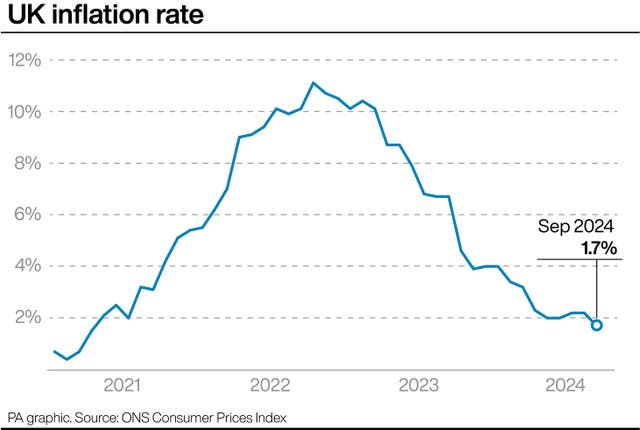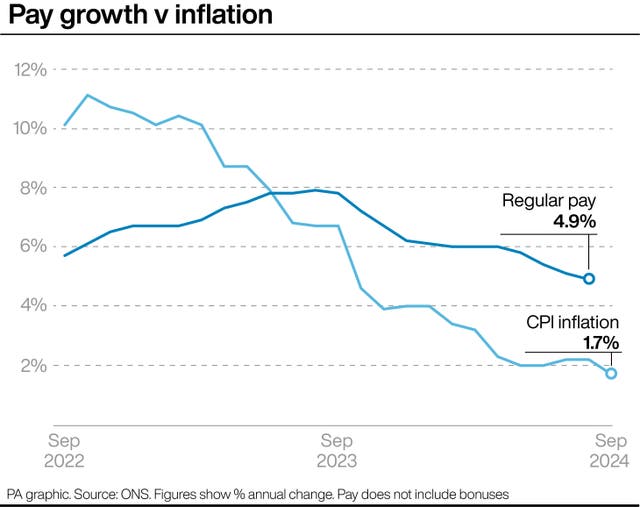UK inflation falls below 2% target for first time in three years
Office for National Statistics economists said the slowdown in inflation was driven by lower airfares and petrol prices.

Inflation dropped below the Bank of England target rate last month for the first time since April 2021, according to new figures.
The Office for National Statistics (ONS) said Consumer Prices Index (CPI) inflation fell to 1.7% in September, from 2.2% in August.
The slowdown was driven by a sharp slump in petrol prices and lower airfares.
Inflation was lower than expected, with analysts having predicted a reading of 1.9% for the month.

It also indicates that state pensions are expected to increase by 4.1% next April, due to the triple-lock policy.
The heavier-than-predicted fall in the inflation rate is expected to add pressure onto Bank of England rate-setters to cut interest rates, which had been hiked in recent years to bring inflation down to the 2% target.
Policymakers at the central bank’s Monetary Policy Committee (MPC) will decide whether to reduce interest rates – which help set mortgage and borrowing rates – from their current 5% level at a meeting next month.
ONS chief economist Grant Fitzner said: “Inflation eased in September to its lowest annual rate in over three years.
“Lower airfares and petrol prices were the biggest driver for this month’s fall.”
The ONS revealed that motor fuels and lubricant prices were significantly lower, dropping by 10.4% in September compared with the same month a year earlier.
Air travel costs also dragged down on the inflation rate, as lower air fares due to post-summer sales helped to drive a 5% fall in the category.
However, households witnessed the first acceleration in food and non-alcoholic drink inflation since March 2023 last month.
Food and drink inflation rose to 1.9% for the month from 1.3% in August, amid stronger price increases for milk, cheese, eggs and fruit.
Darren Jones, Chief Secretary to the Treasury, said: “It will be welcome news for millions of families that inflation is below 2%.
“However, there is still more to do to protect working people, which is why we are focused on bringing back growth and restoring economic stability to deliver on the promise of change.”
The inflation reading comes after separate ONS data released on Tuesday showed that UK pay growth eased back to its lowest level since mid-2022.
Economists have suggested that weaker pay growth and easing price inflation mean Bank of England officials are very likely to cut rates next month.
Matt Swannell, chief economic adviser to the EY Item Club, said: “With the momentum behind pay growth also having eased slightly in yesterday’s data, today’s release removes another potential obstacle to the MPC voting for a 0.25 percentage point rate cut at its November meeting.
“The key question now is whether the MPC will step up the pace of rate cuts at subsequent meetings, and this scenario would likely require further good news on pay growth and inflation.”

Sanjay Raja, chief UK economist at Deutsche Bank Research, said: “All told, today’s inflation data should be music to the MPC’s ears.
“Inflation momentum is slowing. Services prices – once deemed too sticky in the UK – are coming off faster than expected. The case for sequential rate cuts is rising.”
The figures also showed that CPIH, a measure of inflation which includes owner-occupiers’ housing costs, rose by 2.6%, slowing from 3.1% in the previous month.
Meanwhile, the Retail Prices Index (RPI) rate of inflation slowed to 2.7% from 3.5% in the previous month.





